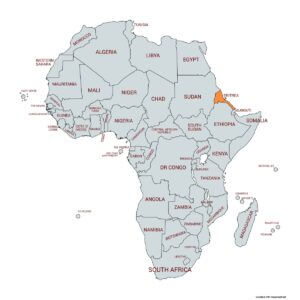发布时间:2022-06-15 10:08:19 文章来源:Africa Investments(业务四部转载)
Country overview: Eritrea is in east Africa. It borders the Red Sea to the east, Sudan to the west, Ethiopia to the south and Djibouti to the south east. Its capital is Asmara with 6 regional states which serves as administrative divisions. It gained independence on 24 May 1991 from Ethiopia. It is a multi-party presidential republic with the President sitting as the Head of State and Head of Government. It runs a unicameral legislative system of government. Eritrea has diverse languages, but Tigrinya, Arabic and English remain the official language. The country’s religion is divided between Islam and Christianity. It has a mixed legal system based on civil, customary, and Islamic laws. It has an area size of 1840 sq km. Eritrea has a strategic location along the world’s busiest shipping lanes and is a member of the Common Market for Eastern and Southern Africa (COMESA).

Demographic Information: Eritrea has an estimated population of 6.08 million comprising mostly of younger population (less than 25 years) which makes up about 58.8% of the population, those in the age bracket of 25-64 years makes up about 37.2% of the population and above 65 years age group makes up about 4.0% of the population. Average population density is estimated at 35 inhabitants/km2. In terms of human development indicators, it has a life expectancy of 68.8 years (Women) and 63.6 years (Men). It achieved universal primary education with an 68.4% Primary enrolment rate in 2018 and overall literacy level of 76.6% as at 2018.

Broad Economic Overview: Agriculture and mining (copper, gold, zinc, silver, colluli potash) are the main drivers of Eritrean economy. Agriculture accounts for 30% of GDP but it is still rudimentary and subject to recurrent droughts. Following conclusion of the Ethiopia-Eritrea war in 2000 which culminated in peaceful relations with Ethiopia, there has been renewed opportunities which places Eritrea in a strategic position on the Horn of Africa. Eritrea emerged from being a closed country as it reopens its’ borders and restores trade, transport and telecommunications links between the neighbouring countries and other key trading partners in Europe and the Far East. Though real GDP growth fell to 3.8% in 2019 due to lower demand of investment and exports, it has managed to sustain a modest GDP growth in the past 5 years having grown 3.3% (5yr compound annual growth). Its currency is Eritrean Nakfa, it is not a convertible currency. There are restrictions on the amount of hard currency that can be withdrawn from banks. Main exports include gold, food, textile, sorghum, livestock etc. Major imports include petroleum products, food, manufactured foods, machinery etc.

Investment Opportunities: The Eritrean government currently focuses on achieving security, most importantly food security. It’s also working on improving its human resources and developing its physical infrastructure. However, these development plans may likely compete and be impacted by continuous large spending on military. Eritrea is a highly militarised country as military and political party exert some level of influence in business in the country. Peace dividend and the normalization of relations with Ethiopia and neighbouring countries is key to trade and investment. Investment opportunities exist in the Mining, Agriculture, Tourism industry, as well as the manufacturing industry. Textile and leather manufacturing industries and packaging industry are also viable areas for investment.
